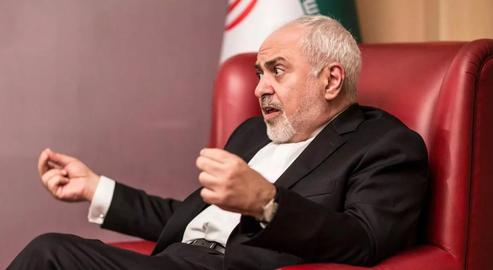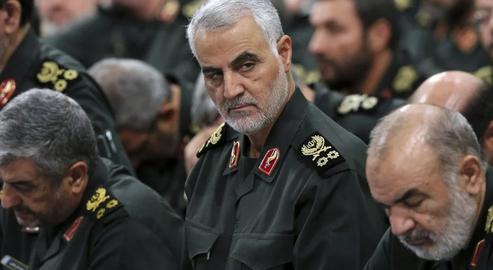In an explosive leaked audio recording from an as-yet unpublished interview, Iranian Foreign Minister Mohammad Javad Zarif has identified a problem that other officials of the Islamic Republic first highlighted some 30 years ago.
The discussion, in which Zarif criticized the unaccountable role of the IRGC’s Quds Force in the foreign policy of the Islamic Republic, was recorded some time ago but not made public. It also sheds some light on Iran’s decades-long failure to merge the IRGC and the regular army.
***
In his published memoirs, former President Akbar Hashemi Rafsanjani proclaimed that in Iran, the Ministry of Foreign Affairs was “practically surrounded” by the IRGC’s Quds Force.
The former premier said the ministry could not so much as appoint an ambassador without coordinating with the Revolutionary Guards, especially in sensitive countries. He stressed that without the IRGC’s pervasive presence, the Foreign Ministry would be much more effective.
The audio file that came to light over the weekend is a testament to the same, long-standing accountability gap in Iranian foreign policy. In the discussion with economist Saeed Leylaz, a copy of which was leaked to Iran International, Foreign Minister Mohammad Javad Zarif lamented that Iran's diplomacy had been "sacrificed" to "the battlefield".
But it also went further; Zarif made pointed reference to an unwritten agreement between the Guards and Russia to sabotage the Joint Comprehensive Plan of Action (JCPOA) - and with it, any alleviation of tensions between Iran and the US, and between Iran and its regional rivals.
The audio file was leaked at a crucial moment as Iranian officials are locked in discussions for a possible US return to the JCPOA. By Sunday night, some of Zarif’s critics were calling for his resignation.
Zarif: Moscow Always Opposed the JCPOA
In a significant break with the official line, Zarif refuted the Guards’ claim – and that of many principlist political figures in Iran, such as Hossein Sheikholesalm, the international advisor to the speaker of parliament – that ex-Quds Force commander General Ghasem Soleimani had had a key role in convincing Russian President Vladimir Putin to intervene in the conflict in Syria.
In fact, Zarif claimed, Putin had already made that decision. Moscow, he said, had “put all its weight” behind creating obstacles to the JCPOA because it was not in Russia's interests for Iran to normalize relations with the West. He noted that after the JCPOA was signed, Russian media outlets had criticized their own Foreign Minister, Sergei Lavrov, for "allowing Iran to slip towards the West."
According to Zarif, Ghasem Soleimani had first requested a trip to Russia in February 2015. But the Kremlin only agreed to this trip in July 2015, after the JCPOA had been signed and once the balance in Syria had tipped in favor of Bashar al-Assad. Zarif described the trip as "in line with the destruction of the Foreign Ministry" and entirely at Russia's behest.
The comments also flew in the face of those of other regime officials who insist Soleimani had a decisive role in drawing Russia into the Syrian proxy war. Mehdi Sanaei, Iran's ambassador to Russia, had previously claimed that Soleimani's insight into Syria and its strategic importance meant "Russia does not see any advisor more trustworthy than commander Soleimani."
But Zarif clearly stated in the interview that Putin had decided to intervene in Syria long before Ghasem Soleimani's visit. With the timeline and his other comments, he also intimated that Russia's intervention in Syria had been useless in practice, and to the detriment of Iran's own interests.
Elsewhere, Zarif railed against other acts of aggression involving the Revolutionary Guards’ Quds Force which, he said, were meant to disrupt a US return to the JCPOA. Among the examples he cited were the Guards’ writing slogans such as "Israel must disappear" on missiles, attacking the Saudi embassy, and seizing American ships in foreign waters.
President Hassan Rouhani and even conservative ex-deputy speaker Ali Motahari have made similar comments in the past. In a pre-election debate in May 2015, Rouhani had explicitly said that "underground [missile] cities were displayed so as to disrupt the JCPOA. They wrote slogans on the missiles to disrupt the JCPOA."
The difference in Zarif’s remarks was that he also highlighted the alleged role of Russia in this adversarial campaign. He located Russia's presence in Syria within the Revolutionary Guards' wider efforts to discredit the JCPOA, thus effectively identifying both the Guards and Russia as the two main culprits for the harm done to the agreement.
The Foreign Ministry in Service of the Battlefield
In the published extract from the interview, which is not thought to have been intended for publication, Zarif stated baldly that the Foreign Ministry had always been beholden to the Quds Force. Soleimani, he claimed, had tried to make demands of him before each round of nuclear negotiations, and had not heeded any of his own recommendations in return.
"I sacrificed diplomacy for the battlefield," Zarif said in the interview. "Every time I went to negotiate, Commander Soleimani would tell me to request this and that. On the other hand, for example, I asked him not to use Iran Air flights to Syria [to transfer forces or equipment]. But he said Iran Air was safer than Mahan Air."
The foreign minister said: "In the Islamic Republic, the battlefield rules... diplomacy has been sacrificed to the battlefield." He added: "If the goals of the battlefield dominate the country's strategy, [other countries] can play [with Iran]."
The term "battlefield" in Zarif's remarks is assumed to mean both the physical arenas of war in which Iran has a stake, and its discursive battle with countries such as Saudi Arabia and the United States. This second, ideological “war” is in many ways the priority for both the Supreme Leader leader of the Islamic Republic and the Quds Force.
Foreign Minister is Well Aware of his Relegated Status
The Iranian Foreign Ministry has not disputed the authenticity of the recording. But spokesman Saeed Khatibzadeh called it “unethical politics” and said the portion of the audio released was not fully representative. Critics of Javad Zarif, meanwhile, have accused him of undermining national security.
In the interview, Zarif had also said that the structure of the foreign policy was mostly "security-oriented" and the nuclear negotiators were bound not just by the wishes of Ali Khamenei but by the Guards. He added that Khamenei had recently “forcefully rebuked” him for saying Iran was willing to work with the US to return to a deal.
The clash of interests between the foreign ministry and unelected decision-makers in Iran have been made plain on many occasions, including Zarif's absence from a 2019 meeting between Bashar al-Assad and Ayatollah Khamenei and Rouhani, which led to his resignation. After he resigned, Esmaeil Ghaani, Ghasem Soleimani's successor and the current commander of the Quds Force, said "those who needed to know" about the Syrian leader's visit to Iran were made aware of it, and "those who did not need to know did not know ".
The release of this audio file also coincided with a letter sent by Javad Zarif to the Supreme Leader of the Islamic Republic. In his latest missive to Khamenei, Zarif reportedly affirmed that he intends to conclude the nuclear talks and will not run for president.
The letter may have been intended to show that the Vienna talks will not affect the presidential election – something that few people assumed anyway – and to encourage Khamenei and his entourage not to disrupt or hinder the Vienna talks. Ultimately, like the rest of Iran’s elected decision-makers and indeed its foreign policy, Zarif’s political future depends heavily on the political views of the Supreme Leader and those that advise him.
Related coverage:
IranWire Exclusive: Javad Zarif is "Frustrated" With the Guards and the Government
Iran’s President and Foreign Minister Knew the Guards Shot Down Passenger Plane
Zarif Says Truth of Downed Ukrainian Plane May 'Never be Revealed' in Leaked Audio File
Iran’s New Ambassador to Yemen is a High-Ranking Quds Force Commander
visit the accountability section
In this section of Iran Wire, you can contact the officials and launch your campaign for various problems


























comments